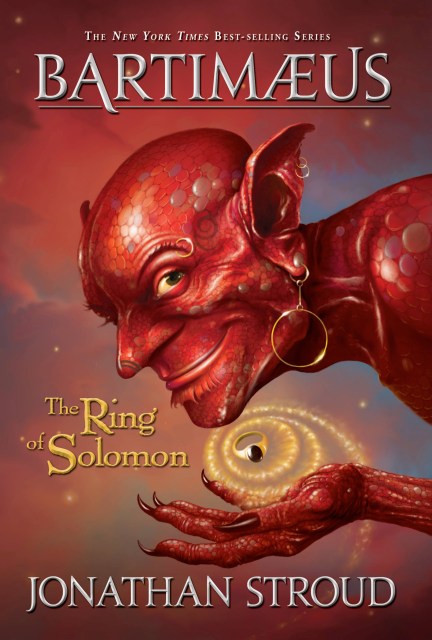By clicking “Accept,” you agree to the use of cookies and similar technologies on your device as set forth in our Cookie Policy and our Privacy Policy. Please note that certain cookies are essential for this website to function properly and do not require user consent to be deployed.
The Ring of Solomon
Contributors
Formats and Prices
- On Sale
- Jan 24, 2012
- Page Count
- 416 pages
- Publisher
- Little, Brown Books for Young Readers
- ISBN-13
- 9781423124047
Price
$14.99Price
$19.99 CADFormat
Format:
- Trade Paperback $14.99 $19.99 CAD
- ebook $7.99 $9.99 CAD
- Audiobook Download (Unabridged) $31.99
This item is a preorder. Your payment method will be charged immediately, and the product is expected to ship on or around January 24, 2012. This date is subject to change due to shipping delays beyond our control.
Buy from Other Retailers:
Bartimaeus, everyone’s favorite (wise-cracking) djinni, is back in book four of this New York Times bestselling series that is perfect for fans of Artemis Fowl and Amari and the Night Brothers.
Thousands of years before his fateful service to the magician Nathaniel in London, wily Bartimaeus served as djinni to hundreds of masters, from Babylon and Ancient Egypt to the modern Middle East. Now fans can go back in time with the djinni, to Jerusalem and the court of King Solomon in 950 BCE. Only in this adventure, it seems the great Bartimaeus has finally met his match.
A spellbinding addition to Jonathan Stroud’s beloved Bartimaeus series, The Ring of Solomon brims with dazzling wit, unforgettable characters, and powerful themes of freedom and slavery, with or without magical bonds.
★ “A must-purchase for all fantasy collections.”—School Library Journal, starred review
Read the entire Bartimaeus Sequence series:
The Amulet of Samarkand
The Golem’s Eye
Ptolemy’s Gate
The Ring of Solomon
For another thrilling adventure from Jonathan Stroud, don’t miss the Lockwood & Co series.
-
Praise for the Bartimaeus Sequence series:
-
* "A must-purchase for all fantasy collections."School Library Journal, starred review
-
* “Bartimaeus's pointed humor makes for a story worth savoring."Publishers Weekly, starred review
-
* "The trilogy wraps up with excitement, adventure and an unexpected wallop of heart and soul. . . Stroud masterfully weaves together four characters and an unearthly realm of existence in an explosive culmination…”Kirkus Reviews, starred review
-
* "For readers who loved the earlier volumes for the sheer adventure, this, with its battles, magic and great crashing conclusion, will not disappoint. A worthy ending to an exceptional saga."Booklist, starred review
-
* “This closing installment is the best yet…Stroud is a masterful storyteller, balancing touching sentiment with humor, explosive action scenes with philosophical musings on human nature…a stunning end to a justly acclaimed trilogy.”Horn Book, starred review
-
* “So rarely do humor and plot come together in such equally strong measures that we can only hope for more adventures.”Horn book, starred review
-
“In a contemporary London full of magic, a thrilling adventure unfolds.”Kirkus Reviews
-
“The pace never slows in this wisecracking adventure…Stroud has created a compelling fantasy story in a well-realized world, but it is the complementary characters of Bartimaeus and Nathaniel that will keep readers coming back for the rest of the [series].”Horn Book
-
"Not since Gulliver's Travels has a children's writer managed to combine a thrilling tale of magic and adventure with such deliciously pointed comedy."The Times
-
"The truly original touch is the way Stroud alternates Nathaniel's story with the djinni's own knowing and irascible first-person narrative.”Diana Wynne Jones, Guardian Review
Newsletter Signup
By clicking ‘Sign Up,’ I acknowledge that I have read and agree to Hachette Book Group’s Privacy Policy and Terms of Use







